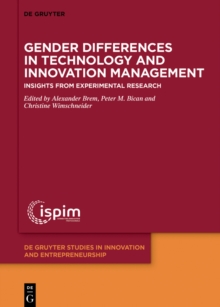
Gender Differences in Technology and Innovation Management : Insights from Experimental Research Hardback
Edited by Alexander Brem, Peter M. Bican, Christine Wimschneider
Part of the De Gruyter Studies in Innovation and Entrepreneurship series
Hardback
Description
Even though the number of working women has steadily increased over the last few years, women are still significantly under-represented in STEM activities (i.e. mathematics, informatics, science and technology). In order to eliminate this under-representation, numerous education policies and corporate initiatives, particularly in the recent past, have been aimed at increasing women's enthusiasm for STEM activities and professions.
According to the latest surveys, however, it is clear that these efforts have not yet led to the desired success.
Compared to their male counterparts, women continue to do fewer STEM activities. One possible reason for this is that relatively little is yet known about the concrete impact of the above education policies on working with innovation and technology: What are the gender differences between women and men?
Is it enough to recognize these differences, or should these differences ideally not only be recognized, but also treated appropriately or even encouraged? This anthology deals with current topics in technology and innovation management against the background of these and other gender-relevant aspects.
Empirical analyses and experiments in collaboration with companies from various sectors provide a sound scientific basis on which new results and findings are presented: How do women and men deal with creativity and competition?
How are technologies applied and how can differences in access to technology be deduced? Answers to these and other questions help decision-makers in politics and business to proactively use the differences between women and men to motivate women to work in the STEM field and to strengthen them by acknowledging existing differences.
Information
-
Only a few left - usually despatched within 24 hours
- Format:Hardback
- Pages:120 pages, 2 Illustrations, color; 14 Illustrations, black and white; 9 Tables, black and white
- Publisher:De Gruyter
- Publication Date:20/04/2020
- Category:
- ISBN:9783110590791
£96.50
£84.09
Information
-
Only a few left - usually despatched within 24 hours
- Format:Hardback
- Pages:120 pages, 2 Illustrations, color; 14 Illustrations, black and white; 9 Tables, black and white
- Publisher:De Gruyter
- Publication Date:20/04/2020
- Category:
- ISBN:9783110590791










